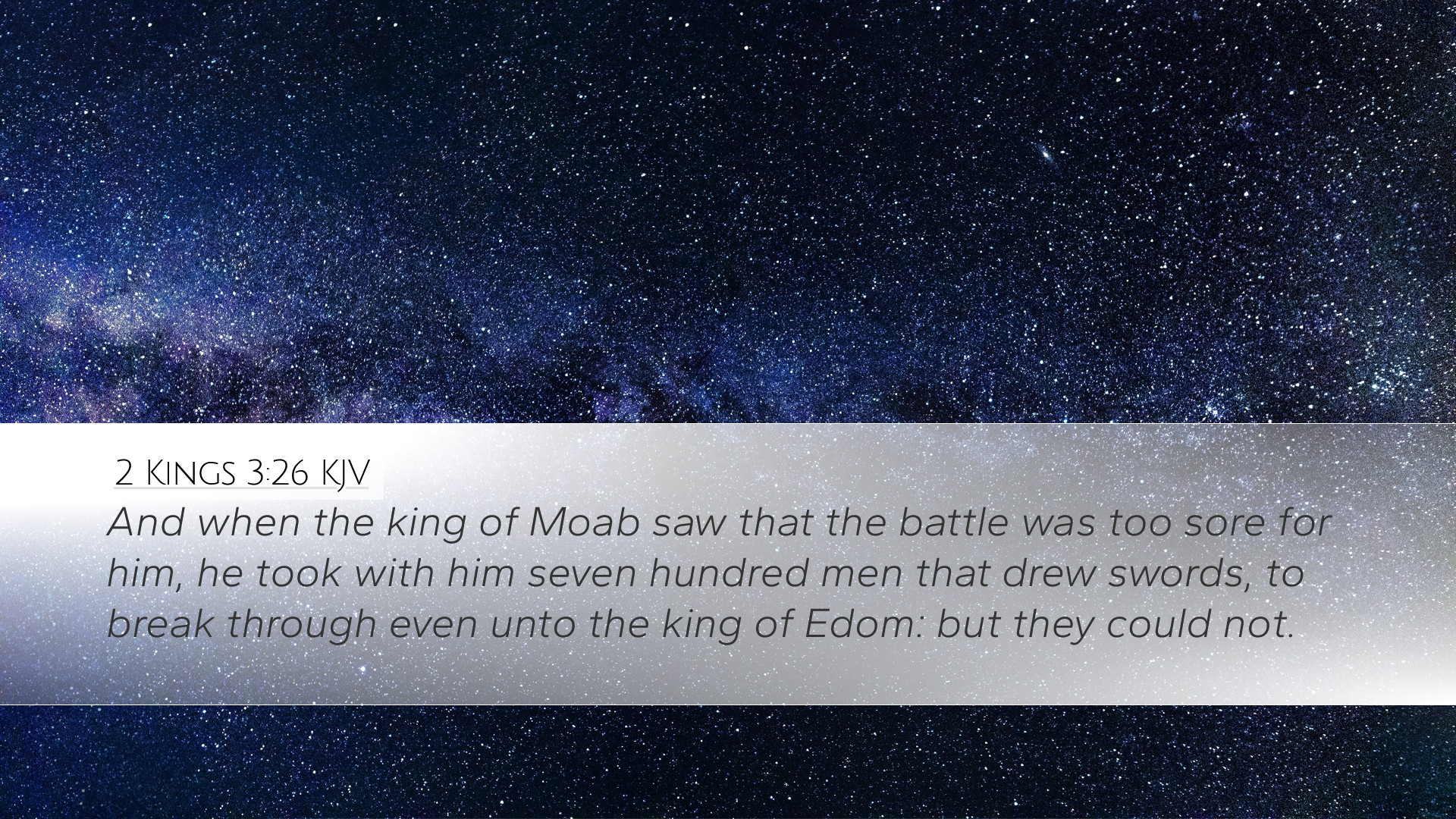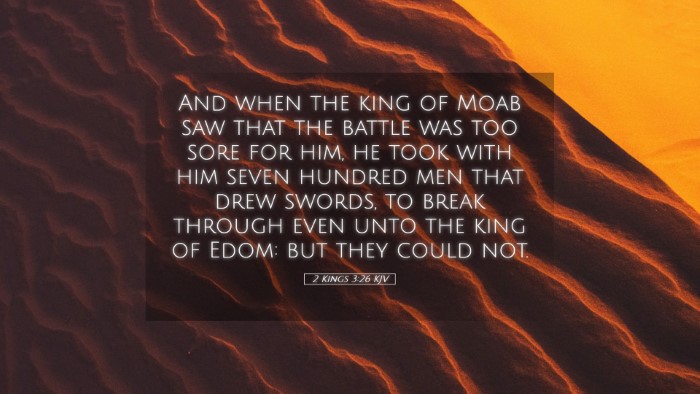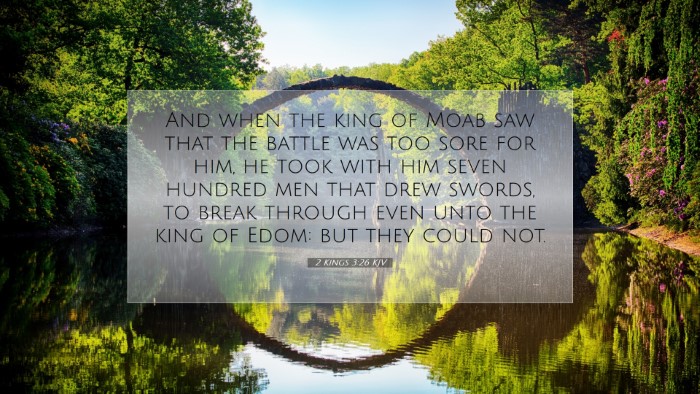Commentary on 2 Kings 3:26
Verse Text: "When the king of Moab saw that the battle was too sore for him, he took with him seven hundred men that drew swords, to break through even unto the king of Edom: but they could not." (2 Kings 3:26, KJV)
Contextual Overview
The Book of 2 Kings continues the narrative following the reign of Solomon, detailing the activities and fates of the kings of Israel and Judah. The chapter highlights the coalition of kings, including Jehoram of Israel and Jehoshaphat of Judah, against the Moabites, led by Mesha, the king of Moab. This passage reflects the dire circumstances faced by Mesha as his forces were overwhelmed by the coalition.
Matthew Henry's Commentary
Matthew Henry presents a theological reflection on the king of Moab’s desperate situation. He emphasizes the idea of divine providence and the consequences of rebellion against God. The context reveals that the Moabites had forsaken tribute to Israel, leading to this military confrontation.
- The Desperation of Mesha: Henry notes that the distress financially and militarily compels Mesha to seek extraordinary measures, indicating how severe the battle was for him. His actions to attempt a breakout symbolize despair.
- The Strategic Attempt: The choice to bring seven hundred men indicates a significant effort but underscores the futility when against the sovereign plan of God. Henry suggests that human strength is flawed against divine will.
- Divine Judgment: The defeat of Moab is seen as judgment from God, emphasizing the importance of understanding the Lord’s hand in the outcomes of conflicts. The Moabites’ rebellion is contrasted with Israel’s reliance on God.
Albert Barnes' Commentary
Albert Barnes focuses on the historical and cultural dimensions of the verse, aiming to elucidate the relations among the kingdoms during this pivotal moment. He explains the political and military landscape that necessitated these actions.
- Military Tactics: Barnes delves into the military strategies employed by Mesha, noting the significance of employing a band of seasoned swordsmen, illustrating both desperation and the hope for tactical advantage.
- Failure to Escape: The unsuccessful attempt to breach enemy lines serves as a motif within the narratives of Scripture, often reflecting the larger theme of divine intervention among nations.
- Existential Reflection: Barnes encourages reflection on the psychology of a leader in crisis, using Mesha's choice to arm men to fight, even in a moment of utter hopelessness, to speak to the human condition.
Adam Clarke's Commentary
Adam Clarke provides insights not only on the events of the passage but also discusses the importance of understanding how secular and divine interventions intermingle during a conflict. His analysis shows the importance of recognizing the providence of God.
- Symbolism of Seven Hundred Men: Clarke notes that the number seven is significant throughout the Bible, often symbolizing completeness. This suggests that Mesha’s efforts, though complete in human terms, were ultimately futile against the divine.
- Historical Context: Clarke discusses the historical relations of Israel and Moab, mentioning the strained interactions and the reasons for the conflict. This background helps modern readers grasp the political nuances at play.
- Lessons in Humility: The commentary concludes with a call to humility and dependence on God’s grace as humans face seemingly insurmountable challenges, mirrored in Mesha's plight.
Theological Insights
The combined perspectives from these commentaries yield significant theological insights that can inform pastoral care, deeper study, and the preaching of this text:
- The Reality of Conflict: Life is often marked by battle; whether spiritual, emotional, or physical, understanding the nature of these struggles in the light of Scripture is essential for faith-based living.
- Dependence on God: The futility of Mesha's effort underlines human limitations and emphasizes the necessity of relying on God in crises. This dependence is central to Christian faith, as outlined in many New Testament passages as well.
- Providential Guidance: The narrative suggests that God orchestrates the events in human history for a greater purpose, reminding believers of His sovereignty amidst turmoil and confusion.
- Hope Amidst Desperation: Even in dire situations, believers are called to remain hopeful. This reflects a core aspect of the Christian narrative—a narrative that does not end in despair but looks towards redemption.
Conclusion
In summary, 2 Kings 3:26 serves as a poignant reminder of the realities of human conflict, the importance of divine reliance, and the providential workings of God. The insights drawn from Matthew Henry, Albert Barnes, and Adam Clarke encourage readers—be they pastors, students, theologians, or scholars—to approach scripture not merely as a historical document but as a living text that speaks into the complexities of life today.
As one contemplates the gravity of this passage, let it serve as a catalyst for further study, reflection, and application of God’s Word in their respective areas of ministry and scholarship.


